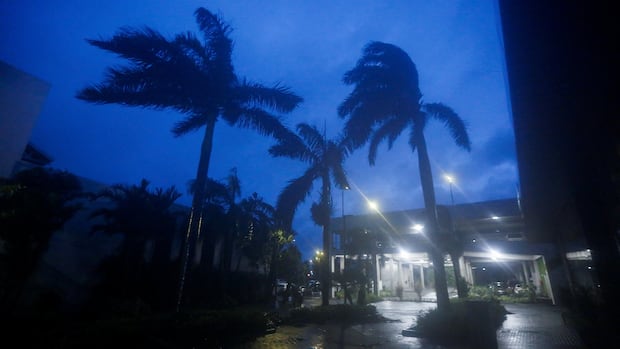Jamaican official warns of ‘life-threatening’ risk from Hurricane MelissaEvan Thompson, principal director of Jamaica’s meteorological service, said Tuesday morning that rainfall and wind gusts have started in parts of the country as Hurricane Melissa moves closer. Thompson, who warned of ‘catastrophic’ damage, said the storm is expected to make landfall as a Category 5 hurricane.The LatestHurricane Melissa made landfall on Jamaica’s southwestern coast shortly after 1 p.m. ET, the U.S. National Hurricane Center confirmed.The storm is the strongest to lash the island since record-keeping began 174 years ago.It is expected to slice diagonally across the island, from south to north, before hitting Cuba.Many residents are sheltering in place despite government orders to evacuate, according to media reports.”There is no infrastructure in the region that can withstand a Category 5,” said Jamaican Prime Minister Andrew Holness.Jamaican officials warned residents that conditions will soon worsen, despite heavy rains already battering the island before the storm’s landfall.UpdatesOctober 2812 minutes agoCanadian tourists holed up in hotel conference room Sarah PetzAfter their flight home from Jamaica on Sunday was cancelled, Stephanie Brayford and her family are now sheltering in place in a hotel conference room in Negril on the island’s west coast. The storm is “nothing like anything I’ve experienced,” Brayford told CBC News Network host Andrew Nichols. “And I have experienced a tornado,” she said. “The winds just take your breath away.”Brayford said hotel staff tried to board up the entrance to protect the building from the intense winds, but the boards “were gone within hours of putting them up.”For now, she said, she and her family are safe, holing up with other guests in the conference room while sleeping on deck chair cushions. But when they’ll be able to make it back home to Canada remains to be seen. 13 minutes agoSome flights to Cuba cancelled as Melissa approachesNatalie StechysonA man walks in the rain before the arrival of Hurricane Melissa in Canizo, a village in Santiago de Cuba, on Oct. 28, 2025. (Ramón Espinosa/The Associated Press)Flights to Cuba are being affected as Hurricane Melissa is scheduled to hit the popular tourist destination next.Air Canada noted that flights to Varadero and Cayo Coco could be affected over the next couple days, while WestJet issued a travel advisory for Holguin and Turks and Caicos. Sunwing Vacations and Air Transat have both posted travel advisories for Holguin.“We’re seeing flight cancellations, particularly to Holguin, today and tomorrow,” Toronto Pearson Airport duty manager Sonny Parmar told CP24 earlier today.According to SkyScanner, nearly all flights in and out of Holguin’s airport were cancelled today. A WestJet flight to Holguin scheduled to leave Toronto’s Pearson Airport today was cancelled.The Government of Canada’s travel advisory website says all travel to Cuba’s eastern provinces should be avoided. That includes Granma, Santiago de Cuba, Guantanamo, Holguin and Las Tunas.29 minutes agoCanadian Hurricane Centre issues first advisory for MelissaNicole MortillaroWhile Hurricane Melissa is currently far from Canada, its forecasted path will take it off the coast of Newfoundland — though that could change in the coming days.The Canadian Hurricane Centre (CHC) has issued its first advisory for the storm. “The CHC will be monitoring the evolution of Hurricane Melissa this week as it begins moving through the Caribbean. While the hurricane accelerates northward, a large area of low pressure will form over the northeastern U.S. bringing rain and strong winds to a large portion of eastern Canada,” the statement said. “The wind circulation of Melissa is expected to track well offshore (likely near or over the southern Grand Banks) and not directly affect land. The large non-tropical low over eastern Canada could tap into some moisture from the hurricane that could influence its intensity and rainfall potential.”34 minutes agoMelissa downgraded to Category 4Nicole MortillaroThe latest update from the U.S. National Hurricane Center says Melissa is now a Category 4, with maximum sustained winds of 240 km/h. This was expected, as hurricanes tend to weaken once over land. However, let’s not forget that dropping a category doesn’t make it any less dangerous to life and property.And it still remains to be seen what will happen once Melissa goes over open water again as it makes its way toward Cuba and then the Bahamas in the coming days.The National Hurricane Center’s next full advisory is expected at 5 p.m. ET. 41 minutes agoNicole MortillaroHere’s the most recent satellite coverage of Hurricane Melissa as it crossed over Jamaica.One for the history bookes. This morning #Melissa became one of the strongest hurricanes ever at landfall in the Atlantic. Truly astonishing. Here is a close-up view of its landfall this afternoon. pic.twitter.com/TrIakU0dXD—aguacerowx50 minutes agoHow Melissa measures up to other Atlantic stormsSarah PetzWe know Hurricane Melissa is now one of the strongest hurricanes on record to hit the Caribbean.The Associated Press took a look at how it compares to some other powerful Atlantic hurricanes: Hurricane Allen: This storm killed more than 200 people in 1980 when it swept through Haiti before swooping into Texas. Its highest sustained winds reached 305 km/h.Hurricane Dorian: More than 70 people died when this storm hit the Bahamas with 296 km/h winds in 2019.Hurricane Irma: Irma packed winds of 290 km/h when it caused more than $700 million in damage across Puerto Rico in 2017. Hurricane Mitch: This storm triggered mudslides and floods that left more than 11,000 dead after it hit the east coast of Central America in 1998, with winds of 290 km/h. Labour Day hurricane: A rare storm without a name, this 1935 hurricane with 295 km/h winds remains one of the most powerful hurricanes storms to hit the U.S., devastating the Florida Keys and leaving damage across the Atlantic Coast. 1 hour agoMany are staying put despite evacuation ordersSarah PetzHi everyone, I’m Sarah Petz, a writer with the live story pages team based in Toronto. Colin Bogle, an adviser for the humanitarian aid organization Mercy Corps who is based near Kingston, told the Associated Press that many families in the Jamaican capital are staying put and sheltering in place, despite government evacuation orders. Bogle was staying with his grandmother in Portmore, just west of Kingston, where everything went dark earlier this morning after a loud explosion.”The noise is relentless,” he said of the hurricane. “People are anxious and just trying to hold on until the storm passes.”1 hour agoJess ChinHi, I’m Jess, a producer with CBC News. I’ll be taking over curating your live updates this afternoon as we continue to monitor Hurricane Melissa’s landfall in Jamaica. 1 hour ago‘Too late’ to cut down trees, electricity utility saysNatalie StechysonJamaica has suffered damage to critical elements of its power network, Winsome Callum, director of corporate communications for the Jamaica Public Service utility, told CBC News Network.In addition, “we have had to take some plants off-grid because of the danger posed by storm surges on the south coast of the island,” she said.She warned people to stay indoors, noting that people have been “panicking” and trying to cut down their trees. In some cases, they’ve caused more damage to the power network by felling power lines in the process, she said. In other cases, people have been badly injured.“Don’t try to do that now. It’s too late,” Callum said.1 hour agoNicole MortillaroClimate change is intensifying extreme weather events like droughts, floods, heat waves — and hurricanes.I’ve already mentioned that our oceans are the warmest they’ve ever been, and that increase in ocean heat means there’s more fuel for hurricanes.“We know that warmer ocean temperatures boost the intensity of hurricanes. So if they’re encountering water warmth and ocean warmth that is above what is typical — what is expected even during the peak of hurricane season — we know that directly can be attributed and is a cause of climate change,” said Shel Winkley from Climate Central.But rising sea levels also play a role by amplifying dangerous storm surges.Some research suggests that hurricanes are also now stronger and last longer. Because there’s more moisture in the air, storms can drop more rain than in the past, causing life-threatening floods.Other research suggests that more Atlantic hurricanes are moving further inland.And finally, as discussed earlier, we’re seeing more of these powerful storms rapidly intensify.
Wednesday, 4 Feb 2026
Canada – The Illusion
Search
Have an existing account?
Sign In
© 2022 Foxiz News Network. Ruby Design Company. All Rights Reserved.
You May also Like
- More News:
- history
- Standing Bear Network
- John Gonzalez
- ᐊᔭᐦᑊ ayahp — It happened
- Creation
- Beneath the Water
- Olympic gold medal
- Jim Thorpe
- type O blood
- the bringer of life
- Raven
- Wás’agi
- NoiseCat
- 'Sugarcane'
- The rivers still sing
- ᑲᓂᐸᐏᐟ ᒪᐢᑿ
- ᐅᑳᐤ okâw — We remember
- ᐊᓂᓈᐯᐃᐧᐣ aninâpêwin — Truth
- This is what it means to be human.
- Nokoma











